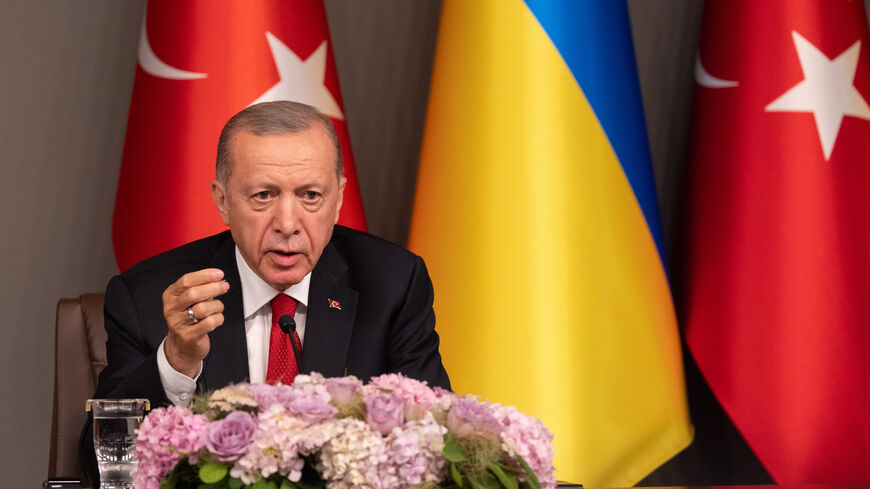Turkey agreed to advance Sweden’s NATO bid on Monday after intense diplomacy in the Lithuanian capital Vilnius, where a two-day summit of the alliance is set to kick off Tuesday.
NATO Secretary General Jens Stoltenberg announced Monday that Turkish President Recep Tayyip Erdogan had agreed to ask its parliament to advance Stockholm’s bid to join the transatlantic alliance, calling it a "historic step which makes all NATO allies stronger and safer."
Glad to announce that after the meeting I hosted with @RTErdogan & @SwedishPM, President Erdogan has agreed to forward #Sweden's accession protocol to the Grand National Assembly ASAP & ensure ratification. This is an historic step which makes all #NATO Allies stronger & safer. pic.twitter.com/D7OeR5Vgba
— Jens Stoltenberg (@jensstoltenberg) July 10, 2023
President Joe Biden swiftly hailed the news, saying he stood “ready to work with President Erdogan and [Turkey] on enhancing defense and deterrence in the Euro-Atlantic area." In a statement issued by the White House he added, "I look forward to welcoming Prime Minister [Ulf] Kristersson and Sweden as our 32nd NATO Ally. And I thank Secretary General Stoltenberg for his steadfast leadership.”
The news came after Erdogan met with Stoltenberg and Kristersson for a second time Monday, part of a last ditch attempt to get Ankara to approve Sweden's bid.
The breakthrough deals a blow to Russia's efforts to drive a wedge in the Western security alliance and will likely prompt Hungary, another holdout, to approve Sweden's bid as well.
It remains unclear what Erdogan secured in exchange for his climb down other than NATO's pledge to appoint a "special coordinator for counterterrorism" and further pledges from Sweden to address Turkey’s security concerns under a under a new bilateral Security Compact that will meet annually at ministerial level announced by NATO in a statement.
Erdogan could yet hold up a vote in the parliament if he so chooses.
Erdogan had raised the stakes further ahead the key summit in Vilnius and a meeting with Biden tomorrow, suggesting that Ankara’s stalled membership talks with the European Union should be revived in exchange for greenlighting Sweden’s accession to the alliance.
“First, pave the way for Turkey in the European Union and then let us pave the way for Sweden, just as we paved the way for Finland,” Erdogan told reporters before taking off for the Lithuanian capital, where he held trilateral talks with Stoltenberg and Kristersson which apparently yielded no results.
The call for a tradeoff on the EU is the latest in a series of Turkish demands in exchange for approving Sweden's membership. They include Erdogan’s insistence that Sweden prevent pro-Kurdish demonstrations from taking place on its soil and extraditing various individuals Turkey labels as terrorists.
Stoltenberg backed Erdogan’s call, saying that he supported Turkey’s ambition of joining the EU, an empty gesture since he has no influence over the decision. German Chancellor Olaf Scholz, however, pushed back saying that Turkey's ill-fated stab at joining the European bloc could not be linked to Sweden's bid to join NATO.
Erdogan’s last-minute brinkmanship before the summit kicks off on July 11 is part of a long-running strategy of extracting maximum concessions before yielding to pressure, much of it from the United States.
In a thinly veiled reference to congressional sanctions on military sales to Turkey stemming from its 2019 invasion of northern Syria and acquisition of Russian missile batteries, Erdogan said he would use the summit to “repeat our call to the allies who impose sanctions and restrictions on Turkey to quickly turn back from this mistake.”
Opinion remained divided to the last minute as to whether Erdogan would cave. Marc Pierini, a former EU ambassador to Ankara and a senior fellow at Carnegie Europe, aired doubts, saying the Turkish leader had painted himself into a corner. “The EU gambit lacks credibility,” Pierini said, recalling that Turkey’s dismal human rights record “disqualifies Turkey from membership negotiations.”
Most notably, Turkey continues to ignore European Court of Human Rights' rulings calling for the immediate release of philanthropist Osman Kavala and Kurdish politician Selahattin Demirtas, who have been in jail since 2017 and 2016 respectively on thinly-evidenced terror charges. Turkey’s EU demand “looks primarily like an unrealistic off-ramp from Ankara’s self-engineered deadlock on Sweden,” Pierini said.
Sweden’s bid to join NATO after decades of determined neutrality together with Finland followed Russia’s February 2022 invasion of Ukraine. Even as he listed reasons for objecting to Sweden’s adherence, Erdogan said he supported Ukraine’s membership, reasoning that ending the war with “a just and lasting peace as soon as possible will further facilitate Ukraine’s NATO membership process.” That comment will have surely riled the Kremlin, which aired its anger this weekend over Turkey’s decision to allow five members of Ukraine’s paramilitary Azov regiment to fly back home with visiting Ukrainian President Volodymr Zelenskyy.
In a Sunday phone call with Biden, Erdogan made many of the same arguments, though they were not reflected in the White House readout. It said the pair had taken up “a range of issues that NATO leaders will consider at the summit, expressed their shared commitment to continue supporting Ukraine, and reviewed efforts to strengthen our bilateral ties.”
“President Biden also conveyed his desire to welcome Sweden in NATO as soon as possible,” the readout noted.
The Turkish presidency said the sides had agreed to meet in person in Vilnius and to discuss regional issues in detail. The meeting is expected to take place Tuesday evening.
The readout from the Turkish presidency said that despite having taken “certain steps in the right direction” — a reference to Sweden’s recently revamped anti-terror legislation — its failure to prevent demonstrations in support of the outlawed Kurdistan Workers Party, or PKK, that is waging an armed campaign against the Turkish state rendered such moves “meaningless.”
Erdogan also apparently raised the ongoing controversy over Turkey's efforts to buy US F-16 fighter jets. The White House backs the sale. Congress insists that Turkey needs to lift its veto on Sweden’s membership first. Linking Turkey’s acquisition of F-16 jets to Sweden’s membership was misguided, the Turkish readout observed. Nonetheless, the Turkish leader thanked Biden for his support for the sales.
Update: July 10, 2023. This article has been updated since it's initial publication.








